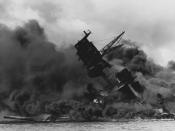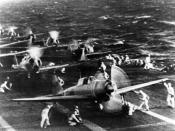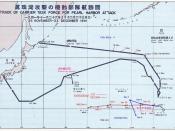"Why, given the intelligence of Japanese naval movements available to the Americans, did the attack on Pearl Harbor on Sunday December 7, 1941, come as an apparent surprise?"
Over sixty years after the attack on Pearl Harbor, it is frustrating to see just how avoidable the devastation was. "Never before have we had so complete an intelligence picture of the enemy. And perhaps never again will we have such a magnificent collection of sources at our disposal" There are many reasons as to why, as Feldman put it, "In purely tactical terms, Pearl Harbor was among the most successful military operations of World War II" . Crucial signals were lost in a sea of irrelevancies, those that did make it to a commander's desk were often interpreted poorly, and there was a gross underestimation of the Japanese, both in their abilities, and their audacity.
It is easy now to distinguish between the important documents and the insignificant ones, but as Wohlsetter writes, "before the event it is obscure and pregnant with conflicting meanings" .
Evidence suggesting a possible attack was lost in a sea of signals concerning what was then considered more likely events. "In Washington, Pearl Harbor signals were competing with a vast number of signals from the European theatre... The far eastern signals were also arriving at a center of decision where they had to compete with the prevailing belief that an unprotected offensive force acts as a deterrent rather than a target... In Honolulu they were competing... with a large number of signals announcing Japanese intentions and preparations to attack Soviet Russia" .
Yet a possible attack on Pearl Harbor was not considered out of the question. The Martin-Bellinger report, presented in August 1941 by Colonel William Farthing to the Army and Navy Commanders in Hawaii "...predicted,


